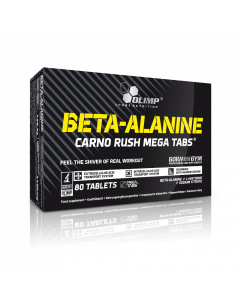5% OFF FIRST ORDER WITH CODE FRST5 AT CHECKOUT!
Beta-Alanine For Good Performance And Optimal Fitness Results

You’ve probably come across beta-alanine.
Pick up most pre-workout products today, and you’re bound to see beta-alanine listed somewhere on the product’s label.
But what is beta-alanine, and what benefits does it offer? More importantly, how does it work inside the body, and is it safe to consume?
Let’s discuss.
What is Beta-Alanine, And How Does It Work?
Beta-alanine is a non-essential amino acid, which the body produces every day. To understand the amino acid and its work, we first have to get familiar with an important molecule: carnosine. The molecule is primarily found in the brain and muscles and serves as a buffer to hydrogen ions (1, 2).
We accumulate hydrogen ions inside our muscles as we train and break down adenosine triphosphate (ATP). The process lowers the muscle pH, which creates an acidic environment, causes a burning sensation in our muscles, and makes us fatigued.
Beta-alanine is an essential structural element of the molecule carnosine, which, as mentioned above, serves as a buffer to hydrogen ions (3). As a result, pH levels drop more slowly in response to training, delay the burning sensation, and allow us to train slightly harder (4, 5).
What Benefits Does Beta-Alanine Offer?
Beta-alanine supplementation is ergogenic. Meaning, taking the amino acid improves our training performance and delays fatigue. As a result, we can train slightly harder and longer, which can result in better fitness progress.
According to research, beta-alanine’s effects are most pronounced for activities that last between 60 and 240 seconds, which makes sense (6). Since the compound serves as a buffer to hydrogen ions, it takes a while for its effects to show. In other words, you might not see much of a benefit on a single 10-second set. But beta-alanine becomes effective in activities where the burning sensation becomes a limiting factor.
A large meta-analysis from a few years back further confirmed these ideas (7):
β-alanine had a significant overall effect while subgroup analyses revealed a number of modifying factors. These data allow individuals to make informed decisions as to the likelihood of an ergogenic effect with β-alanine supplementation based on their chosen exercise modality.
But What About Beta-Alanine For Muscle Gain?
According to a couple of studies, beta-alanine supplementation leads to slightly better lean mass gains compared to placebo (8, 9). In these studies, athletes saw significant improvements in athletic performance and lean mass gains.
One potential mechanism could be the improved work capacity from supplementing with beta-alanine. Since the amino acid serves as a buffer to acidity, we can speculate that it allows trainees to do slightly more work before getting fatigued. As we know from research, doing more work is correlated with superior hypertrophy (10).
Still, it’s important to note that we need more research to determine how beneficial beta-alanine is for muscle gain.
Is Beta-Alanine Safe, And Should You Worry About Timing It?
No research finds any adverse effects from beta-alanine supplementation. A small percentage of subjects have reported mild GI discomfort, but nothing more than that.
From what we’ve seen in studies, a daily dose of around three grams seems optimal. Beta-alanine is great because we don’t have to worry about timing it to reap its benefits. The goal of supplementation is to raise muscle carnosine levels. So, taking beta-alanine consistently matters far more than timing it to perfection.
Sources:
1 - https://pubmed.ncbi.nlm.nih.gov/29502490/
2 - https://www.sciencedirect.com/topics/agricultural-and-biological-sciences/carnosine
3 - https://www.sciencedirect.com/science/article/abs/pii/S1043452617300475?via%3Dihub
4 - https://pubmed.ncbi.nlm.nih.gov/23899755/
5 - https://www.ncbi.nlm.nih.gov/pmc/articles/PMC6042354/
6 - https://www.ncbi.nlm.nih.gov/pmc/articles/PMC3374095/
7 - https://www.ncbi.nlm.nih.gov/pubmed/27797728
8 - https://www.ncbi.nlm.nih.gov/pubmed/19210788
9 - https://www.ncbi.nlm.nih.gov/pubmed/21659893
10 - https://www.ncbi.nlm.nih.gov/pmc/articles/PMC6303131/

 Polish
Polish



















Comments